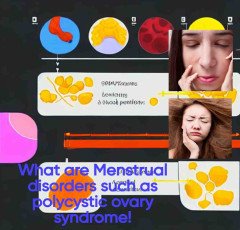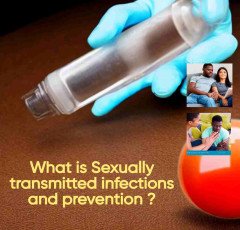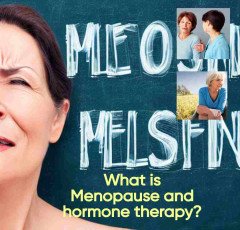
What are Menstrual disorders such as polycystic ovary syndrome (PCOS)?

The menstrual cycle, or regular monthly cycle of bleeding that women experience while they are fertile, is affected by illnesses known as menstrual disorders.
One such menstruation disorder is polycystic ovary syndrome (PCOS).
High amounts of androgens, or male hormones, are a hallmark of PCOS, a hormonal condition that affects women of reproductive age.
This hormonal imbalance can result in the growth of several ovarian cysts, which can obstruct the natural ovulation process and cause irregular menstruation cycles.
PCOS can cause infertility, heavy bleeding, irregular periods, acne, excessive body and facial hair growth, weight gain, and insulin resistance.
Other health issues like type 2 diabetes, high blood pressure, and heart disease can also be made more likely by PCOS.
Genetics, insulin resistance, and inflammation may all be factors in PCOS, while the precise etiology is yet unknown.
PCOS is often treated with a mix of lifestyle modifications (such as diet and exercise), hormone-balancing drugs, and occasionally surgical treatments to remove cysts or promote fertility.
Women may also experience the following menstruation issues in addition to PCOS:
Amenorrhea:
Women of reproductive age who are amenorrheic do not get monthly periods. It can be brought on by conditions like pregnancy, breastfeeding, menopause, hormonal imbalances, or the use of specific drugs.
Dysmenorrhea:
Dysmenorrhea is the term for painful menstrual cycles that can be brought on by a variety of conditions, including endometriosis, uterine fibroids, hormone imbalances, and pelvic inflammatory disease.
Menorrhagia:
Menorrhagia is an abnormally heavy or protracted menstrual flow that can be brought on by uterine fibroids, hormonal abnormalities, or specific drugs.
Premenstrual Syndrome (PMS):
Premenstrual Syndrome (PMS) is a collection of emotional and physical symptoms that might appear in the days before a period. Bloating, breast soreness, mood swings, and headaches are among symptoms.
Premenstrual Dysphoric Disorder (PMDD):
Premenstrual dysphoric disorder (PMDD) is a severe form of premenstrual syndrome (PMS) that can result in serious mental and physical symptoms such despair, anxiety, and extreme mood swings.
The nature and underlying cause of the disease will determine the best course of treatment for menstruation disorders.
Medication, dietary modifications, and surgery are all possible forms of treatment. In order to prevent long-term issues, it is crucial for women to discuss any unusual menstruation symptoms with their healthcare professional as soon as possible.
The following are some lifestyle modifications that can be beneficial in controlling menstruation disorders:
Maintaining a healthy weight:
Hormone levels can be impacted by being overweight or underweight, which can also interfere with menstrual periods. Menstrual periods can be regulated by eating a nutritious diet and exercising regularly.
Eating a healthy diet:
Eating a balanced diet that is high in fruits, vegetables, whole grains, and lean protein can support both hormone balance and general health.
Regular exercise:
Exercise on a regular basis can assist to control hormone levels and enhance general health. On most days of the week, try to get in at least 30 minutes of moderate activity.
Stress management:
Stress can alter hormone levels and interfere with menstrual periods. Deep breathing, yoga, and other stress-management practices can improve hormonal balance and help you feel less stressed.
Avoiding smoking and drinking too much alcohol:
Smoking and excessive drinking both have the potential to disrupt hormone levels and negatively impact general health.
Hormonal contraceptives, hormone replacement treatment, and hormone-level-regulating drugs may all be used to treat menstruation problems. To cure underlying diseases that are causing menstruation difficulties, surgery may occasionally be required.
There are numerous therapeutic options available to assist control symptoms and improve general health, despite the fact that menstrual disorders can be bothersome and uncomfortable. If a woman has any questions about her reproductive health or experiences any unusual menstruation symptoms, she should speak with her healthcare professional.
Alternative or complementary therapies may be helpful for women with menstruation issues in addition to the above-mentioned treatments. Several instances include:
Acupuncture:
This procedure uses tiny needles to stimulate particular body locations. Hormone balance and pain related to menstrual diseases may be improved by acupuncture.
Herbal remedies:
Studies have suggested that some herbs, including chasteberry, ginger, and turmeric, may be helpful for menstruation issues. Before using any herbal medicines, it's crucial to see a healthcare professional because they may interact with prescription drugs or have other side effects.
Menstrual issues may be improved by using mind-body practices such as meditation, biofeedback, and guided imagery to help with stress reduction and general well-being.
Dietary supplements:
Some supplements, such magnesium and omega-3 fatty acids, may help to control hormone levels and reduce inflammation.
It's crucial to remember that alternative therapies shouldn't be used in place of medical care.
Before trying any new treatments or supplements, women with menstruation difficulties should always consult with a healthcare professional to make sure they are secure and suitable for their particular requirements.
Women of all ages can experience menstrual abnormalities, which are a common and frequently distressing condition.
Thankfully, there are a variety of efficient treatments available to control symptoms and promote general health. Women who suffer any unusual menstruation symptoms should consult their doctor to identify the underlying issue and create an effective treatment strategy.
Women should prioritize their reproductive health by visiting their doctor on a regular basis, engaging in safe sexual practices, and keeping up with suggested checkups and tests. Women should not delay in seeking medical assistance if they are having menstruation symptoms or are worried about their reproductive health because prompt diagnosis and care can help to avoid long-term consequences.
For menstruation illnesses to be less stigmatized and shamed, and for women's reproductive health to be prioritized by society as a whole.
This entails expanding access to healthcare, information, and resources as well as encouraging open and sincere discussions about reproductive health.
Although menstrual diseases like PCOS can be troublesome and disruptive, there are numerous effective therapies available to control symptoms and promote general health. Women can take charge of their menstrual health and enhance their quality of life by collaborating with their healthcare practitioner and placing a priority on their reproductive health.
For women with menstruation issues to look for both medical care and emotional support.
This can entail speaking with a therapist or counselor, signing up for a support group, or getting in touch with friends and family who can provide insight and encouragement.
It is very crucial that women understand the potential long-term effects of untreated menstruation problems.
Women who have PCOS, for instance, may be more susceptible to endometrial cancer, type 2 diabetes, and high blood pressure. The prevention of problems and enhancement of overall health outcomes can be achieved with regular monitoring and management of these disorders.
A woman's physical, emotional, and mental health can be significantly impacted by menstrual diseases, which are a complicated and varied issue. Women can successfully manage their menstrual illnesses and enhance their quality of life by getting the medical help they need, getting emotional support, and making their general health a top priority.
It is important to remember that menstruation diseases can affect women in a variety of ways and have a variety of reasons.
For instance, some women may have painful periods as a result of endometriosis, a disorder where tissue that resembles the lining of the uterus grows outside of the uterus, while others may experience heavy or irregular periods as a result of hormonal imbalances.
Depending on a woman's age, reproductive history, and other medical issues, menstrual disorders may affect her differently than other conditions. For instance, hormonal abnormalities during adolescence may make menstruation problems more prevalent in younger women, whereas menstrual disorders may be more common in older women as a result of perimenopause or menopause.
It's important to note that menstruation-related cultural and societal attitudes can affect how women perceive and treat menstrual problems.
Menstruation may be stigmatized or viewed as shameful in some cultures, which can make it more challenging for women to get emotional or medical support for menstrual illnesses.
We can improve outcomes for women with menstrual disorders and advance reproductive health and well-being by raising awareness of and understanding of menstrual disorders, encouraging honest and open discussions about reproductive health, and working to lessen stigma and shame associated with menstruation.
The effect that menstruation abnormalities may have on a woman's everyday activities and life is another crucial factor to take into account.
Menstrual diseases can obstruct work, school, social activities, and other facets of everyday life, depending on the intensity of the symptoms.
For instance, women who have heavy or protracted periods may feel weak or have trouble focusing, which can make it harder to carry out everyday duties or engage in physical exercise. Women who get painful periods could have to miss work or school, or they might not be able to engage in certain activities.
Menstrual disorder sufferers should discuss their symptoms and needs with their doctor, and the two of them should collaborate to create a management strategy that takes into consideration each person's unique lifestyle and preferences. This may involve using drugs to treat pain and other symptoms, changing one's diet or lifestyle habits, or making adjustments at work or school to help manage symptoms.
Women with menstruation disorders can find successful methods for managing their symptoms by collaborating with their healthcare provider to develop techniques that work for them. This will enable them to carry on with active, full lives.
It's also important to note that a woman's fertility and reproductive health may be impacted by menstruation diseases.
Women with PCOS, for instance, may struggle to ovulate and become pregnant, whilst those with endometriosis may see scarring and damage to their reproductive systems.
It's crucial for a woman to discuss her options with her healthcare provider if she's having trouble getting pregnant or is worried about her reproductive health. There may be therapies or interventions that can assist to improve fertility and raise the likelihood of conception, depending on the underlying cause of the menstrual issue.
Should understand that for many women, menstruation problems are a typical and natural aspect of reproductive health.
We may lessen stigma and encourage a more welcoming and open mindset toward menstruation and reproductive health by encouraging education, knowledge, and understanding of menstrual problems. This can encourage women to take charge of their menstrual health and seek the assistance and care they require to lead healthy, fulfilling lives.
In conclusion, illnesses like PCOS and endometriosis that alter a woman's menstrual cycle can result in symptoms including irregular periods, discomfort, and heavy bleeding. A woman's daily life, reproductive health, and emotional and mental well-being can all be significantly impacted by these diseases.
When enduring menstruation difficulties, women should seek medical care and mental assistance.
Medication, lifestyle changes, and adjustments at work or school are all possible treatment choices to control symptoms. If a woman has worries, she may also need to talk to her doctor about her fertility and reproductive health.
We can encourage women to take charge of their menstrual health and seek the assistance and care they require to live healthy, happy lives by raising awareness of and understanding of menstrual diseases and working to lessen stigma and shame surrounding menstruation.
Ladies should put their menstrual health first and seek medical help if they need to.
Women can take a number of crucial measures to maintain good menstrual health, such as:
Menstrual cycle tracking:
Using a calendar or period tracker app, women should monitor their menstrual cycle and take note of any changes or inconsistencies.
Open communication with medical professionals:
Women should not be afraid to bring up any worries or symptoms they may be experiencing with their doctor because early detection and treatment can help to avert more significant health issues in the future.
Maintaining a healthy lifestyle:
Maintaining a healthy lifestyle can help regulate hormones and enhance general health, which includes menstruation health. This includes eating a diet that is balanced, exercising frequently, and getting enough sleep.
Reducing stress:
Menstrual health is impacted by stress, therefore women should give self-care activities like yoga, meditation, and talking to a mental health professional a priority.
Using menstruation products safely:
In order to avoid infection or other issues, women should use menstrual products, such as pads, tampons, or menstrual cups, carefully and in accordance with instructions.
Women can better manage menstruation illnesses and preserve their overall reproductive health and well-being by making menstrual health a priority in their lives.
To comprehend the importance of maintaining good menstrual health for overall health and wellbeing.
Women can effectively manage menstruation abnormalities and avert more significant health issues in the future by prioritizing their menstrual health and getting medical help when necessary.
In addition to the actions I previously outlined, women may also support one another, communicate honestly about their experiences, and advocate for better menstrual health legislation and services in order to promote menstrual health and lessen stigma associated with menstruation.
This can involve promoting better access to period products, menstrual hygiene instruction, and workplace and educational regulations that take menstrual requirements into account.
We can contribute to ensuring that all women have the resources and support they need to live healthy, happy, and full lives by putting a priority on menstruation health and working together to lessen stigma and promote understanding.
It is imperative that we seek to remove obstacles to menstrual health and raise awareness of the significance of menstrual health.
This entails doing everything in our power to guarantee that all women have access to reasonably priced, safe menstrual products, menstrual hygiene instruction, and tools and assistance for dealing with menstruation disorders and associated health problems.
We can contribute to the reduction of stigma and give women the tools they need to take charge of their reproductive health and live their best lives by promoting menstruation health as a crucial component of general health and wellbeing.















 RPM 3.0
RPM 3.0  Favorite Company (Cuelinks)
Favorite Company (Cuelinks)  One World Collection
One World Collection  SEO Checklist
SEO Checklist  Top Rated From Amazon
Top Rated From Amazon  Graphics & Design
Graphics & Design  Artificial Intelligence
Artificial Intelligence  Sennheiser
Sennheiser  NordLocker
NordLocker  Women Fashion
Women Fashion  Best Selling Books
Best Selling Books  BEST SELLER TOP10
BEST SELLER TOP10  Unlimited access to classes on illustration, photography, design, film, music
Unlimited access to classes on illustration, photography, design, film, music  ASPINAL LONDON
ASPINAL LONDON  Acer Laptop
Acer Laptop  TitTok Revolution
TitTok Revolution  NordVPN
NordVPN  1150+Trendy kids coloring pages Bundle
1150+Trendy kids coloring pages Bundle  Men Clothing
Men Clothing  NordPass
NordPass  Smart Doorbell
Smart Doorbell  Hello Theme
Hello Theme  The Click Engine
The Click Engine  All Wireless Products
All Wireless Products  Best Robotic Vacuum Cleaners
Best Robotic Vacuum Cleaners  Unreal Engine 5 For Beginners Learn The Basics Of Virtual Production
Unreal Engine 5 For Beginners Learn The Basics Of Virtual Production  Best Sellers On Amazon
Best Sellers On Amazon  Online Marketing
Online Marketing  Creative Brief For Video Shoot
Creative Brief For Video Shoot  Hot Bags For Pain Relief
Hot Bags For Pain Relief  SOFAS
SOFAS  Best Home Appliances
Best Home Appliances  ELECTRONIC ACCESSORIES
ELECTRONIC ACCESSORIES  ASUS Laptop
ASUS Laptop  The Secret Email System
The Secret Email System  Only For The United States
Only For The United States  Online Technology Classes
Online Technology Classes  Amazon Best Selling Products
Amazon Best Selling Products 
















